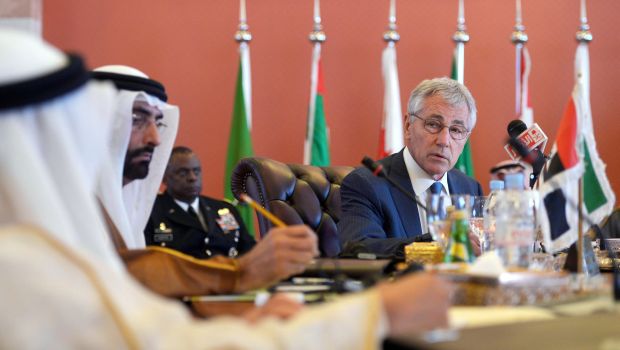
US Defense Secretary Chuck Hagel (R) speaks during the opening session of a Gulf Cooperation Council defense meeting in Jeddah, Saudi Arabia, on May 14, 2014. (REUTERS/Mandel Ngan/Pool)
Hagel took part in a meeting of defense ministers from Gulf Cooperation Council member-states in Jeddah on Wednesday. At the beginning of the meeting, Hagel told the assembled ministers that “the United States remains committed to our Gulf partners’ security.”
“As negotiations progress, I want to assure you of two things,” he said. “First, these negotiations will under no circumstances trade away regional security for concessions on Iran’s nuclear program.”
“Second, while our strong preference is for a diplomatic solution, the United States will remain postured and prepared to ensure that Iran does not acquire a nuclear weapon—and that Iran abides by the terms of any potential agreement,” he added.
Speaking to Asharq Al-Awsat ahead of the meeting, a Gulf source with knowledge of Hagel’s agenda who asked to remain anonymous said: “Hagel, through his visit to Saudi Arabia—the first stop in a tour which will also take him to Jordan and Israel—will discuss issues which are sensitive to Gulf states, such as the Iranian issue, the ongoing Syrian crisis, the political situation in Egypt, and terrorism and security developments in Yemen.”
The source added that Hagel would also likely to push GCC allies to develop their cyberdefense capabilities in order to defend their infrastructure from electronic attack.
He said: “The Americans look to exchange information on the evaluation of the capabilities of the Gulf states and to prepare experts in this field, so that Gulf states can develop cyberdefense policies.”
He said Hagel’s latest trip to the region was designed to strengthen common positions in light of the Gulf states’ concerns regarding Iran and attempt to find common ground on approaches to the conflict in Syria. Both issues have been sources of recent tension between the US and its allies in the region.
Following Wednesday’s meeting, Hagel said that the US and the GCC states “agreed that our assistance [to the Syrian opposition] must be complementary—and that it must be carefully directed to the moderate opposition.”
The chairman of the Gulf Center for Strategic and Security Studies, Dr. Abdulaziz Bin Saqr, said there was a desire on both sides to evaluate the risks regarding Iran and the situation in Syria, adding that Saudi Arabia was still pushing the US to provide sophisticated weapons—including anti-aircraft missiles—to the Syrian opposition.
In regards to Iran, Bin Saqr told Asharq Al-Awsat that Gulf fears revolved around Iran’s development of new weapons and ballistic missiles, and Iranian naval activity and the intensive exercises carried out by the country’s Islamic Revolutionary Guard Corps around oil installations, adding these maneuvers gave rise to concerns about the security of oil infrastructure in the Gulf.
He also pointed to the alarm caused by reports of Iranian plans to build a drone base near the Straight of Hormuz, saying: “The Gulf states have concerns about the uncontrolled arms buildup in Iran, as it produces arms and uses them at will and provides them to other parties with no controls.”
Bin Saqr also said a recent major military exercise in Saudi Arabia was partly aimed at signaling that the Kingdom “was moving towards building defensive capabilities which allowed it to rely less on its allies.”
Meanwhile, Dr. Ashraf Kashk, researcher at the Bahrain Center for Strategic Studies, said the meeting was part of a new approach by the US, in which it deals with the GCC as a single entity in defense matters.
He said the US was aware of Gulf fears regarding US defense policy, which is gradually moving towards Asia, and the corresponding reduction of military presence in the Middle East and the Gulf.
Kashk said the timing of the meeting was highly important, as it comes days ahead of a possible permanent nuclear agreement between Iran and six world powers—including the US—and fears in the Gulf that an agreement on Iran’s nuclear program may herald a wider agreement on regional issues, at the expense of the Gulf states.
Obaid Al-Suhaimi contributed reporting from Manama.
